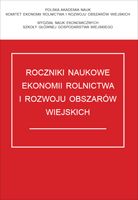Main Article Content
Article Details
Binswanger M. 2010: Die Tretmühlen des Glücks - Wir haben immer mehr und werden nicht glücklicher. Was können wir tun? Herder Verlag, Freiburg-Basel-Wien, wydanie 4.
Frey R. L., Schaltegger S., Gmünder M. 2010: Räumliche Ökonomie. Theoretische Grundlagen, CREMA Center for Research in Economics, Management and the Arts, Basel/Zürich. www.crema-research
Heller J. 2000: Metody regionalizacji obszarów wiejskich w EWG oraz Unii Europejskiej, "Roczniki Naukowe SERiA", 2(4).
Layard R. 2009: Die glückliche Gesellschaft Was wir aus der Glücksforschung lernen können, Campus Verlag, Frankfurt-New York.
Lusawa R. 2009: Possibilities of assessing the diversity of economic growth at level lower than NUTS 3, "Annals of The Polish Association of Agricultural and Agribusiness Economists", 11(6), 88-92.
Markowski T. 1999: Zarządzanie rozwojem miast, Wydawnictwo Naukowe PWN, Warszawa.
Mazowieckie Biuro Planowania Regionalnego w Warszawie, 2005: Strategia e-rozwoju województwa mazowieckiego na lata 2007-2013, Załącznik do Uchwały Nr 153/06 Sejmiku Województwa Mazowieckiego z dnia 4 września 2006 roku.
Strategia rozwoju województwa mazowieckiego do roku 2020. 2006: Mazowieckie Biuro Planowania Regionalnego w Warszawie, (aktualizacja), Warszawa.
Neunteufel M. G. 1997: Nachhaltigkeit - Eine Herausforderung für die ökonomische Forschung, Schriftenreihe der Bundesanstalt für Agrarwirtschaft, nr 79.
Porter M. 1977: New Strategies for Inter-city Economic Development, Economic Development Quarterly, SAGE Publication, Thousand Oaks.
Pszczółkowski S. 1936: Zarys ekonomji, Dom Książki Polskiej, Warszawa.
Stankiewicz W. 2007: Historia myśli ekonomicznej, PWE, Warszawa.
Stiglitz J., Sen A., Fitoussi J.-P. 2009: Report by the Commission on the Measurement of Economic Performace and Social Progress, www.stiglitz-sen-fitoussi.fr.
www.pb.pl/a/2009/07/02/Zaklady_Miesne_JBB_w_Lysych_moga_byc_odbudowane
Wicki, L. (2008). Wykorzystanie postępu odmianowego w produkcji zbóż w polskim rolnictwie. Roczniki Nauk Rolniczych. Seria G, Ekonomika Rolnictwa, 94(2), 136-146. (Crossref)
Downloads
- Jan Pawlak, RELATIONS BETWEEN PRICES OF FARM MACHINES AND PROCUREMENT PRICES OF AGRICULTURAL PRODUCTS DURING THE YEARS 1990-2010 , Annals of Agricultural Economics and Rural Development: Vol. 98 No. 1 (2011)
You may also start an advanced similarity search for this article.
- Roman Lusawa, DIFFERENTIATION OF THE NUMBER OF ACTS OF CRIME RECORDED IN SELECTED COUNTIES OF MAZOWIECKIE PROVINCE , Annals of Agricultural Economics and Rural Development: Vol. 103 No. 2 (2016)
- Roman Lusawa, POSSIBILITY OF MAKING USE OF HERBERT GIERSCH’S CONCEPT OF DEVELOPMENT LEVELS FOR THE CLASSIFICATION OF COMMUNES FOR THE NEEDS OF LOCAL DEVELOPMENT MANAGEMENT ILLUSTRATED WITH AN EXAMPLE OF MAZOWIECKIE , Annals of Agricultural Economics and Rural Development: Vol. 100 No. 3 (2013)
- Roman Lusawa, Influence of agriculture on the processes of population migrations, Mazowieckie province serving as an example , Annals of Agricultural Economics and Rural Development: Vol. 94 No. 1 (2007)
- Roman Lusawa, STATISTICAL DEPENDENCE BETWEEN PROSPERITY MEASURES AND SATISFACTION INDICATORS WITH REFERENCE TO RESIDENTS OF COMMUNES IN MAZOWIECKIE PROVINCE , Annals of Agricultural Economics and Rural Development: Vol. 102 No. 3 (2015)




